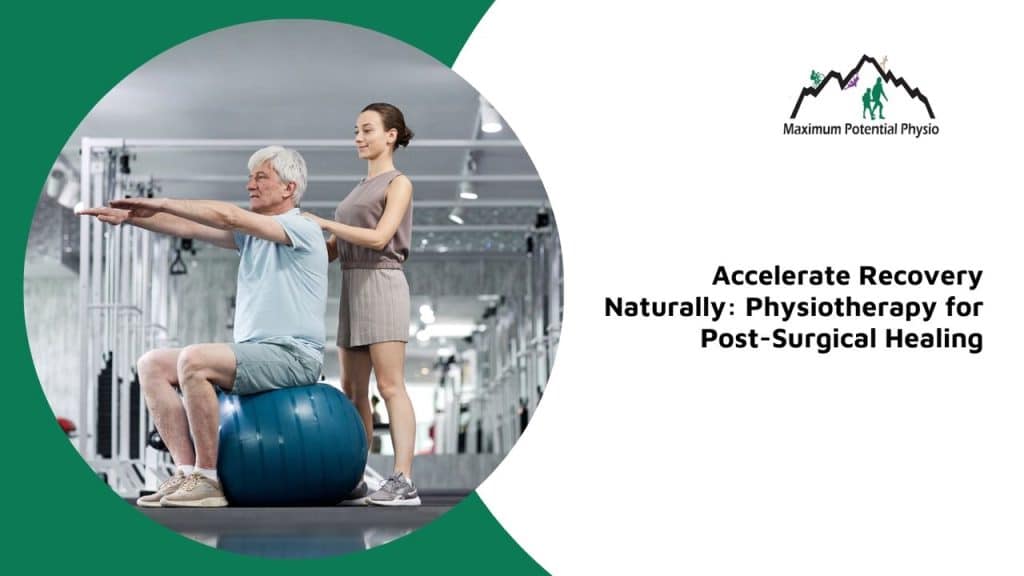Accelerate Recovery Naturally: Physiotherapy for Post-Surgical Healing

Surgery marks an important step toward improving your health, but recovery doesn’t end in the operating room. Post-surgical physiotherapy is a vital part of the healing process, offering targeted treatments to reduce pain, restore mobility, and prevent complications. Whether it’s a joint replacement, spinal surgery, or abdominal procedure, physiotherapy helps you recover safely and efficiently. Let’s explore how physiotherapy supports post-surgical recovery and why it’s an essential component of your healing journey.
The Role of Physiotherapy for Post-Surgical Recovery
Physiotherapy offers a wide range of benefits for people recovering from surgery. It is designed to accelerate healing, manage pain, and restore function effectively.
- Pain Management: Physiotherapy uses techniques such as manual therapy, heat or cold applications, and electrical stimulation to alleviate post-operative pain.
- Improved Mobility: After surgery, stiffness and limited range of motion are common. Physiotherapy helps people regain flexibility and functionality in the affected area.
- Faster Recovery: Structured physiotherapy sessions enhance circulation, reduce swelling, and promote tissue healing, allowing for quicker recovery times.
- Prevention of Complications: Physiotherapy reduces the risk of complications such as blood clots, scar tissue formation, and muscle atrophy by encouraging safe movement.
- Strength Restoration: Targeted exercises rebuild muscle strength, providing support for joints and improving overall stability.
- Personalized Care: Physiotherapists create tailored treatment plans based on the individual’s specific needs, ensuring the recovery process is efficient and effective.
By addressing both immediate and long-term recovery needs, physiotherapy ensures you achieve the best possible outcomes.
Why Is Physiotherapy Important After Surgery?
Physiotherapy is essential for post-surgical recovery as it promotes healing by improving blood flow to the surgical site, aiding tissue repair. It restores function and mobility, helping individuals return to daily activities sooner while also building confidence by overcoming the fear of movement. Physiotherapy reduces reliance on pain medications through non-invasive pain management techniques and enhances overall quality of life by supporting independence and mental well-being. Without physiotherapy, recovery can be delayed, and the risk of complications increases significantly.
Post-Surgery: When Should You Start Physiotherapy?
The timing of physiotherapy after surgery depends on the type of procedure and the individual’s overall health. However, early intervention is often encouraged to maximize recovery benefits.
- Immediate Post-Operative Phase: In many cases, physiotherapy begins within 24–48 hours after surgery. Gentle exercises and breathing techniques are introduced to prevent complications such as blood clots and lung infections.
- Rehabilitation Phase: As the body heals, more intensive treatments, including stretching, strengthening, and mobility exercises, are added to the plan. This phase typically starts within the first week to two weeks post-surgery.
- Long-Term Recovery Phase: Physiotherapy continues for several weeks or months, depending on the complexity of the surgery, to ensure full restoration of strength and function.
Your surgeon and physiotherapist will work together to determine the best timeline for starting physiotherapy, ensuring that it aligns with your unique recovery needs.
Types of Surgeries That Benefit the Most From Physiotherapy
While physiotherapy is beneficial for nearly all types of surgeries, certain procedures rely heavily on post-operative rehabilitation for optimal outcomes:
- Orthopedic Surgeries: Procedures such as knee replacements, hip replacements, ACL repairs, and rotator cuff surgeries require physiotherapy to restore joint function, improve mobility, and rebuild strength.
- Spinal Surgeries: After procedures like laminectomy or spinal fusion, physiotherapy focuses on stabilizing the spine, reducing pain, and improving posture and flexibility.
- Cardiothoracic Surgeries: For people recovering from heart or lung surgery, physiotherapy includes breathing exercises and gentle movements to restore cardiovascular and respiratory function.
- Abdominal Surgeries: Physiotherapy helps strengthen the core muscles and improve posture after procedures like hernia repairs or abdominal reconstruction.
- Oncological Surgeries: For individuals with cancer, physiotherapy supports recovery by addressing fatigue, improving mobility, and managing lymphedema or scar tissue.
- Pediatric Surgeries: Children recovering from corrective surgeries for conditions like scoliosis or clubfoot benefit from physiotherapy to ensure proper development and function.
Physiotherapy is tailored to each surgical procedure, focusing on the specific challenges and goals of recovery for that particular intervention.
Exercises Included in Post-Surgical Physiotherapy
Post-surgical physiotherapy involves a range of exercises designed to restore strength, mobility, and functionality while ensuring a safe recovery. These exercises are carefully tailored to the specific surgery and client’s needs:
- Range of Motion Exercises: Gentle stretches help improve flexibility and prevent stiffness in the affected area. For example, shoulder pendulum exercises or knee flexion movements are common after joint surgeries.
- Strengthening Exercises: Targeted exercises build muscle strength and support the surrounding joints. For instance, leg presses or resistance band workouts are often included after knee or hip surgeries.
- Balance and Coordination Drills: Exercises like single-leg stands or stability ball activities are incorporated to improve proprioception and balance, especially after lower-limb surgeries.
- Core Stabilization: Core strengthening exercises, such as pelvic tilts or planks, are critical for supporting the spine and improving posture after abdominal or spinal surgeries.
- Functional Movements: Functional training focuses on rebuilding the ability to perform everyday tasks, such as walking, sitting, or climbing stairs, with proper mechanics.
- Breathing Exercises: After cardiothoracic or abdominal surgeries, breathing exercises enhance lung function and reduce the risk of complications like pneumonia.
Your physiotherapist will guide you through these exercises, ensuring proper technique and progression based on your recovery timeline.
How Long Does Post-Surgical Physiotherapy Typically Last?
The length of post-surgical physiotherapy depends on several factors, including the type of surgery, the complexity of the condition, and how quickly the individual progresses in their recovery. For minor surgeries, such as arthroscopy or hernia repair, physiotherapy programs are generally shorter, lasting about four to six weeks. These plans often involve one or two sessions per week to address initial healing and restore basic function.
For moderate procedures, like joint replacements or ACL repairs, the recovery timeline is longer. Physiotherapy may span eight to twelve weeks, with more frequent sessions—usually two to three per week—during the early stages of rehabilitation. This approach ensures that strength, mobility, and function are restored effectively.
In cases of complex surgeries, such as spinal fusions or major trauma repairs, physiotherapy programs may extend for six months or more. These long-term plans often begin with frequent sessions and gradually taper off to monthly maintenance appointments as the individual regains strength and independence.
Throughout the recovery journey, your physiotherapist will assess your progress regularly, adjusting the duration and intensity of your program to ensure optimal outcomes and a safe return to daily activities.
Your First Physiotherapy Session After Surgery: What to Expect
The first physiotherapy session after surgery focuses on assessing your condition and creating a personalized treatment plan. Here’s what to expect:
- Comprehensive Evaluation: Your physiotherapist will review your surgical procedure, medical history, and current symptoms. They’ll assess swelling, range of motion, strength, and any movement restrictions.
- Goal Setting: You’ll discuss your recovery goals, whether it’s reducing pain, regaining mobility, or returning to specific activities.
- Gentle Movements: The session may include light exercises or stretches to promote circulation and prevent stiffness. For instance, ankle pumps or heel slides are common initial exercises.
- Pain Management: Techniques like ice application or manual therapy may be used to reduce pain and inflammation.
- Education and Home Exercises: Your physiotherapist will provide guidance on post-surgical care, such as proper posture, safe movements, and exercises to practice at home.
This session lays the foundation for your rehabilitation journey, ensuring that your recovery is both safe and effective.
The Importance of Early Rehabilitation: Risks of Delaying Post-Surgery Physiotherapy
Delaying physiotherapy after surgery can pose several risks and hinder the recovery process:
- Increased Stiffness: Without early movement, joints and soft tissues can become stiff, making it more challenging to regain mobility later.
- Muscle Weakness: Prolonged inactivity can lead to muscle atrophy, slowing down the recovery process and increasing the risk of re-injury.
- Scar Tissue Formation: Delayed physiotherapy may result in excessive scar tissue buildup, limiting range of motion and causing discomfort.
- Higher Risk of Complications: Conditions such as blood clots, poor circulation, or lung infections are more likely without early post-operative activity.
- Prolonged Recovery: Without physiotherapy, the healing process may take significantly longer, delaying your return to normal activities.
Starting physiotherapy promptly after surgery ensures a smoother recovery and reduces the likelihood of these complications.
Let Us Help You Get Back to Your Best
Recovering from surgery is a journey, but you don’t have to navigate it alone. At Maximum Potential Physiotherapy in Calgary NW, our physiotherapists are dedicated to helping you heal safely and effectively. Through personalized treatment plans, we’ll guide you toward regaining strength, mobility, and confidence. Contact us today to book your first session and take the next step toward a full recovery.

